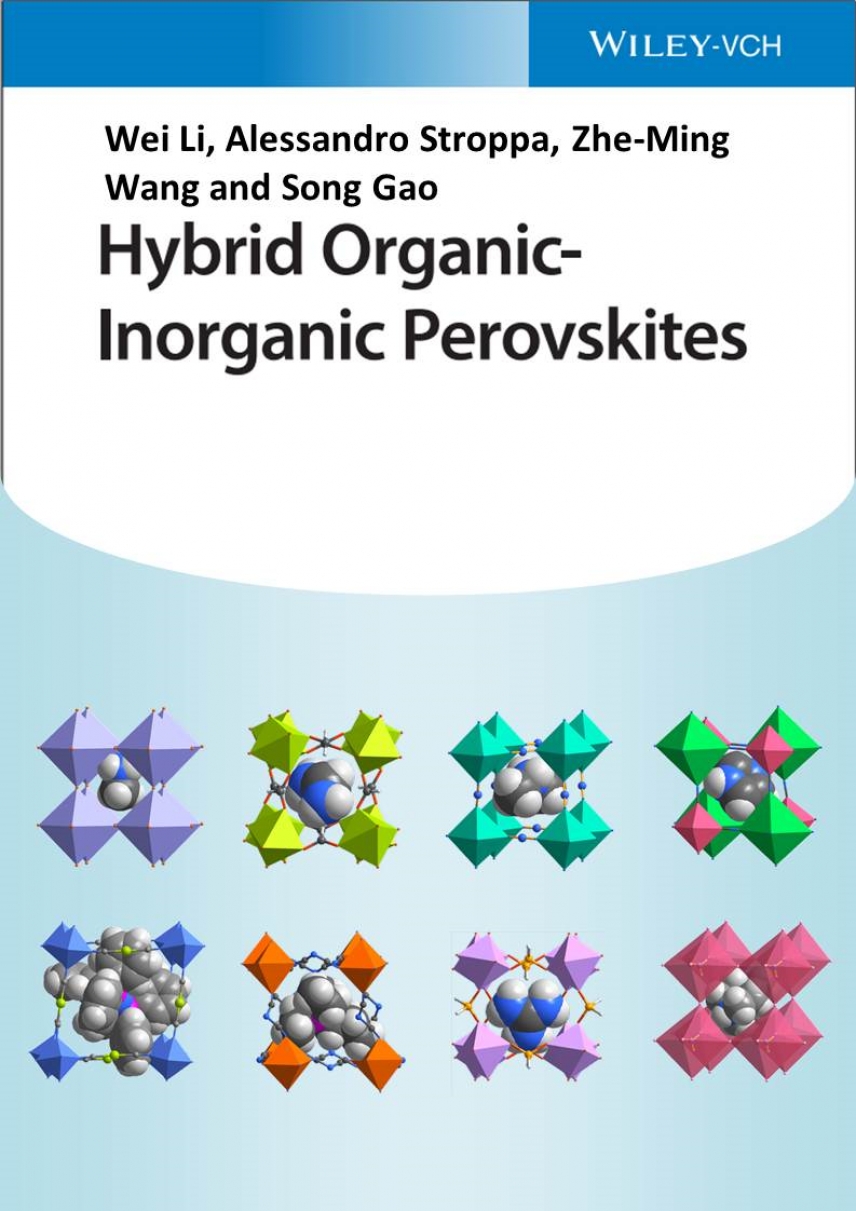Hybrid organic-inorganic perovskites (HOIPs) have attracted great interest in the past decade due to their chemical variability, structural diversity and abundant physical properties. Hitherto, there has not been any book which comprehensively summarizes the synthesis, structures, properties and applications of all types of HOIP materials.
To fill this gap, Alessandro Stroppa and collaborators proposed a book in which they extensively summarized the chemical variability, structural diversity and physical properties of all known HOIP subclasses including halides, formates, azides, dicyanamides, cyanides, hypophosphites, dicyanometallates, perovskite-like hybrid materials and metal-free perovskites. The book presents a comprehensive and complete landscape of HOIPs and associated intriguing physical properties and multifunctionalities, including photovoltaic and optoelectronic properties, dielectricity, magnetism, mechanical properties, ferroelectricity, ferroelasticity and multiferroicity. Moreover, the current challenges and future opportunities in this exciting field are envisaged.
It is useful to both graduate students and experienced researchers since it enables a quick learning of HOIPs for the former and offers a comprehensive and profound coverage of all aspects of HOIPs for the latter. It can also be a useful reference for advanced researchers and specialists. As the field is highly multidisciplinary, the book is appealing to chemists, physicists, material scientists, engineers as well as environmentalists.
Informations about the authors:
Prof. Wei Li is a full Professor of School of Materials Science and Engineering at Nankai University, Tianjin, China. His research interests include the syntheses and physical properties of hybrid organic-inorganic perovskites and metal-organic frameworks, and their relevant applications in energy, optics and mechanics. He obtained his Ph.D. in 2008 from Fujian Institute of Research on the Structure of Matter, Chinese Academy of Sciences. After a post-doctoral training at University of Cambridge, he took a faculty position in the School of Physics at HUST. He has published more than 70 peer-reviewed papers. He started to serve on the editorial board in May-2018 for the journal APL Materials, and then became an associate editor since Jan-2019.
Dr. Alessandro Stroppa is a Senior Researcher at CNR-SPIN Institute, Italy. He received his Ph.D. in Theoretical Condensed Matter Physics from University of Trieste in 2005 and he continued as post-doc at University of Vienna during 2005-2009. He became permanent scientist at CNR-SPIN in 2013. His current research areas is computational materials science focussing on physical properties of HOIPs. He has published more than 105 peer-reviewed papers.
Prof. Zhe-Ming Wang earned his Ph.D. degree on physical chemistry from Peking University in 1996. He had been a COE visiting associate professor in the Institute for Molecular Science, Okazaki, Japan, during 2002-2003. His current research interest covers functional coordination compounds, crystal engineering, molecule-based magnetic and dielectric materials, especially, the functional materials of metal formates. He has published more than 100 papers.
Prof. Song Gao is a Cheung-Kong Professor of Chemistry in South China University of Technology. Over the last 25 years, he has focused on the synthesis and physical properties of functional molecular materials and metal-organic frameworks. He obtained all his degrees in Peking University and became a faculty member after completing PhD in 1988. He worked in RWTH Aachen as a Humboldt Research Fellow from 1995 to 1997. He was elected to a Fellow of the Chinese Academy of Sciences (FACS), the World Academy of Sciences (FTWAS) and the Royal Society of Chemistry (FRSC). He has received many prizes which include the prestigious National Natural Science Award of China, National Award of Science and Technology Progress of China, and Natural Science Award of Ministry of Education of China. Prof. Gao has published about 500 papers with over 29,500 citations and h-index of 89.


